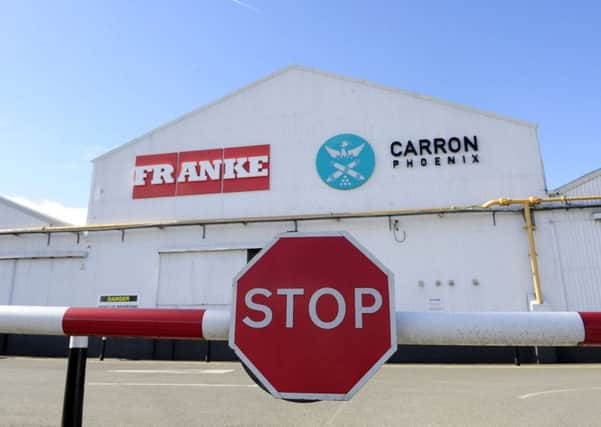Bill Jamieson: Three days to escape this political time warp


With those extra tax raising powers our politics was supposed to have entered a more mature, considered era: the extra levers of devolution would bring a wider recognition of our possibilities – and responsibilities.
But despite those extra powers – perhaps because of them – the battle between Labour and the SNP seems more than ever to be about welfare spending, public sector protection and who can spend the most and spend it fastest. We seem to have fallen into a time warp – back to the 1970s.
Advertisement
Hide AdAdvertisement
Hide AdWhile the battle over benefits grinds on, the economic outlook continues to darken. And it is this, more than any Holyrood pledges and policies, that will determine our wellbeing.
Liz Cameron of the Scottish Chambers of Commerce (SCC) warned earlier this month that the economy in Scotland is now on a knife edge.
And last week brought more lights flashing amber. Early estimates of first quarter UK economic growth showed a fall from 0.6 per cent to 0.4 per cent, the equal lowest growth rate since the fourth quarter of 2012. Year-on-year growth at 2.1 per cent was the weakest since the third quarter of 2013.
Equivalent statistics for Scotland have been persistently trailing these numbers, while our unemployment rate is now running above the UK level. Scotland’s latest annual growth rate, at 1.7 per cent, is below the average forecast of two per cent for the UK. The number of people unemployed in Scotland has risen by 860 to 78,195, with the wider measure showing unemployment is now at 6.2 per cent (UK: 5.1 per cent)
Nor is there an investment or expansion upturn in the pipeline. Net bank lending to non-financial companies fell by £2.5 billion in March, with net lending to small and medium-sized enterprises (SMEs) dipping by £178 million. UK consumer confidence has also taken a hit, falling in April to its lowest level since October, according to the European Commission.
And from the Scottish behemoths of the FTSE 100 last week came warnings of increasingly difficult trading conditions. Engineering giant Weir Group reported a 47 per cent year-on-year drop in orders for its oil and gas division. Original equipment orders were down 40 per cent and aftermarket orders were 49 per cent lower.
Weir, a leading manufacturer of hydraulic fracturing pumps, said it continued to suffer from the slump in the world oil price over the past 18 months and the downturn in North Sea oil investment and activity, despite the pick-up in the oil price since February. It added that economic uncertainty had led to “continued customer caution and project delays”.
Meanwhile, temporary power supplier Aggreko reported underlying revenue for the quarter 14 per cent behind last year. It warned that some of its markets continued to be “challenging”.
Advertisement
Hide AdAdvertisement
Hide AdNow, positive business news there has also been. April has seen a rescue deal for the Clydebridge and Dalzell steel plants in North Lanarkshire; a £97m order for new buses placed by Stagecoach – most of them to be built by Alexander Dennis; the first oil production from the Solan oil field in the West of Shetland area; and large rises in airport passenger numbers at Edinburgh and Glasgow.
But this cannot obscure more disappointing news. This month alone has seen the announced closure of the iconic Carron Phoenix ironworks in Falkirk, with 200 job losses; the threatened closure of two Müller Milk plants in Aberdeen and East Kilbride, with up to 230 job losses; upmarket retailer McEwens of Perth going into administration, and more job losses in the North Sea oil and gas industry.
The overall monthly index readings have also been disappointing. The Bank of Scotland’s latest Purchasing Managers Index (PMI) fell to 48.5 from 49.2 in the previous month. A number below 50 implies economic contraction. And retail sales fell by –1.6%, according to the Scottish Retail Consortium.
Against this background five of Scotland’s leading business figures have voiced concern over the additional business rates supplement now being levied on firms with medium-sized and larger commercial premises. This breaks with the previous level playing field with the rest of the UK.
The doubling of this supplement is expected to add an extra £60m a year to these firms’ rates bills, and affect one in eight commercial premises in Scotland.
The five business groups – Scottish Chambers of Commerce, Scottish Engineering, Scottish Tourism Alliance, Scottish Property Federation and the Scottish Retail Consortium – have spoken out following the First Minister’s remarks at the SNP manifesto launch last week suggesting that the £60m annual rates surcharge would remain in place through the next Parliament.
Bryan Buchan, Chief Executive of Scottish Engineering, said the additional levy on business rates “is a burden which an already struggling manufacturing and engineering sector can ill afford”, while the SCC’s Liz Cameron warned that the decision to double the large business supplement “puts many Scottish businesses at a competitive disadvantage to their counterparts in England at a time when the Scottish economy is underperforming that of the UK as a whole”.
With just three days to go to the poll, could someone in Scottish politics please say something?